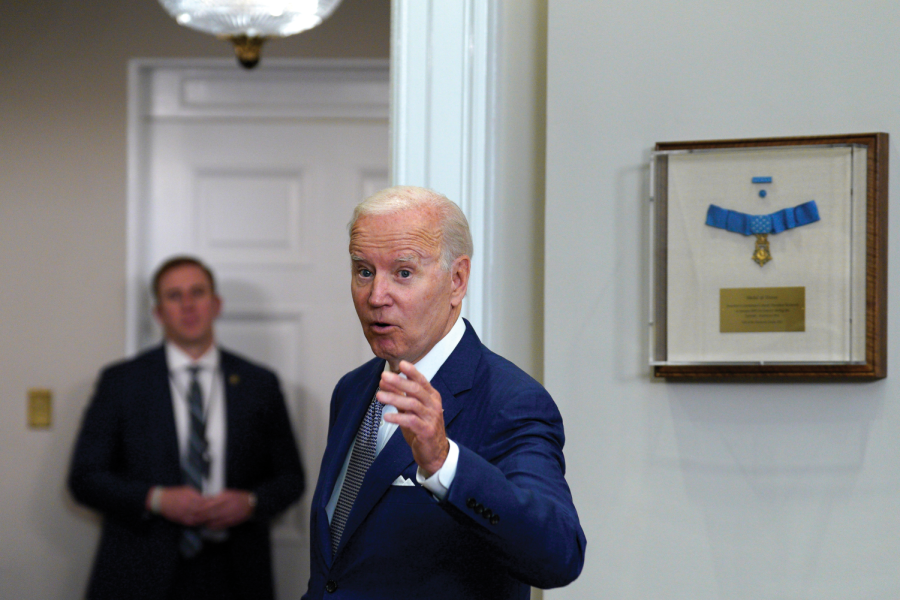Is the US a democracy?
Biden’s Sept. 1 speech used the word “Democracy” 31 times.
Sep 11, 2022
On Thursday, Sept. 1, President Biden gave a speech about the dangers the American democracy faces, using the word democracy 31 times, according to the White House website’s transcript of the speech. On Aug. 19, the New York Times featured a guest essay that said the U.S. should move on from the Constitution altogether in the name of democracy.
Democracy is defined as government by the people, especially rule of the majority, by the Miriam-Webster dictionary. People sometimes criticize the Constitution or decisions by government institutions because they feel the government does not represent the majority well enough.
The framers of the Constitution had specific fears in mind when creating the Constitution because of their experiences. They feared a monarch, and so attempted to limit the powers of the executive. They feared that small states would be dominated by larger states and that states’ rights would be overturned by a strong federal government, so they balanced the Congress with two houses. The House of Representatives is based on population, and the Senate gives two votes to each state, giving equality among the states. They also feared a dangerous, emotional mob, such as during Shays’ Rebellion. Shays’ Rebellion was a revolt by some residents of Massachusetts that nearly overthrew the government of Massachusetts shortly before the Constitution was framed. The Founders attempted to balance the government and placed checks to slow down its processes.
The power of the people is through free and fair elections. Not all free and fair elections are determined by a simple majority, however. Because of the Electoral College and Senate, states with the most people do not control the entire country. Smaller states have influence on elections, too. You might wonder why a simple majority does not always determine the rules. Different states have different issues that face them. Comparing the issues facing New York to those of Wyoming is like comparing apples to oranges. That is why states’ rights are so important.
Sometimes, the federal government taking more power seems like a good idea. The situation may seem to require that approach, and it may be supported by the majority. However, once federal agencies and branches take more powers, it is difficult to give those rights back to the people or the states. That’s why we see the executive and judicial branch wield more power than they did a hundred years ago.
The Bill of Rights in some ways protects the minority over the majority. For example, the first amendment protects the rights of speech and religion. If 90 percent of people say one thing, and 10 percent say the opposite, whose speech would have to be protected? Also, if 90 percent of people follow one religion, and 10 percent follow a different religion, whose religion would have to be protected? If the majority voted on whether or not to permit unpopular speech, they might vote against that of the individual. So we see that certain rights in the Constitution are individual rights guaranteed to every citizen, regardless of whether it is popular or if the majority approves. These rights apply to both the majority and the minority.
There are avenues for the people to change the Constitution. Amendments require two-thirds of either the House of Representatives or of state legislatures to be proposed, and then three-fourths of either the state legislatures or state conventions to ratify. This is difficult for a reason, to keep the Constitution from being changed without much thought and consideration. What the Constitution does is slow down the government. This can be frustrating, but it is easier to stop the federal government from stealing more of the power of the people and to keep a sudden whim of the majority from altering the Constitution for a long time. What may be popular now may be unpopular to the majority ten years later.
The problem with direct rule by the majority is that the whims of the people can change rapidly. With propaganda, dictators can convince enough of the people to give them more power. Julius Caesar was extremely popular with the Roman citizenry. After defeating his enemies within the state, he was eventually proclaimed dictator for life, changing the position of dictator from a six-month office. Even after his death, his influence led to the demise of the Roman Republic and the beginning of the Roman Empire, led by his great-nephew, known most often as Caesar Augustus.
The government set forward in the Constitution is not pure democracy, or simple rule of the majority. It instead balances that with ideals of a republic, governed by a constitution that grants its citizens unalienable individual rights that the government or majority cannot take away. A better description of our government is a democratic or constitutional republic. When people criticize the Constitution for not being democratic enough, remember that it was framed to balance and check one group or branch from growing too powerful, even the majority.


















